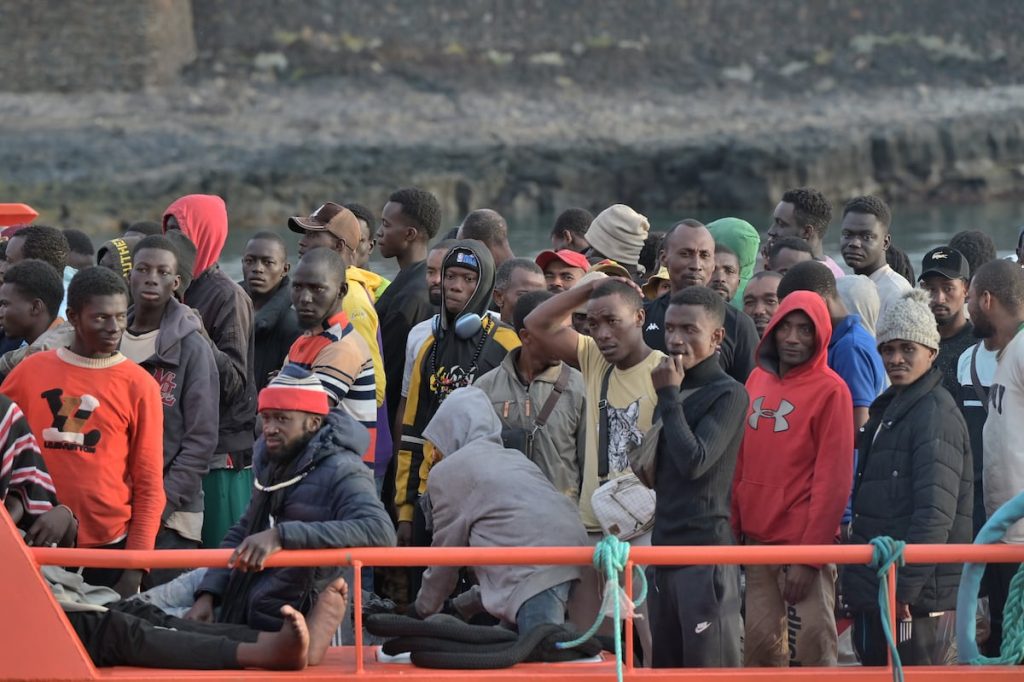During the night of Wednesday, emergency services rescued 461 people, including a woman who had just given birth and her newborn baby, traveling from the west coast of Africa to the Canary Islands on four makeshift boats, according to sources from Salvamento Marítimo. A fifth boat was located near Rasca (Arona, Tenerife) on Thursday morning, but it is still unknown if there were survivors on board. Spokespersons from the public organization described it as a “night of madness.” The intense activity started on Wednesday afternoon when the Norwegian ship Ramform Atlas spotted a boat with around 100 people about 200 kilometers from El Hierro. The Guardamar Urania, departing from Granadilla de Abona (Tenerife), was sent to search for them. Upon arrival, the Urania found not only one boat with around 190 people onboard, including a woman who had just given birth, but also another boat with around 160 people nearby. The Urania conducted the rescue operations, while the Guardamar Talía came to assist the second group at 4:30. The first ship arrived at El Hierro in the morning, and the Talía is expected to arrive in Arguineguín (Gran Canaria) at noon. The Helimer 201 helicopter rescued the mother and her baby from the first boat and took them to a hospital.
At the same time, the two Guardamar ships received a report of a third boat in the area, which was found by the Salvamar Adhara, also dispatched from La Restinga. This particular boat had 67 individuals from Ghana, Senegal, Guinea Bissau, and Mali, making it the most severe situation of the three rescues. The survivors stated that they had departed from Nuakchot (Mauritania) 13 days prior, and during the journey, 10 to 12 of their companions had died, and their bodies were thrown overboard. Three of the rescued individuals were airlifted to hospitals in Tenerife, while the rest arrived at the port of La Restinga on the Adhara shortly before 4 a.m. The fourth rescue of the night involved 44 people, including three women and two minors, drifting between Tenerife and La Gomera on a makeshift boat, bringing the total number of African immigrants rescued alive to 461 on this single night in the Canary Islands. The fifth boat was spotted drifting between the two islands around 11 p.m. and the rescued individuals were brought to Los Cristianos before 5 a.m.
The intense night of rescues in the Canary Islands showcased the relentless efforts of Salvamento Marítimo and other emergency services in saving the lives of hundreds of African migrants attempting the perilous journey across the Atlantic Ocean. The tragic stories of those rescued highlight the desperation and dangers faced by those seeking to reach Europe in search of a better life. The presence of women and children among the rescued individuals sheds light on the vulnerability of these migrants and the hardships they endure during their journey. The heroic actions of the crews involved in the rescues demonstrate the importance of international cooperation and humanitarian efforts in addressing the global challenges of migration.
The humanitarian crisis in the Canary Islands, exacerbated by the ongoing COVID-19 pandemic and economic challenges, underscores the need for comprehensive and coordinated responses to address the root causes of irregular migration. Collaborative efforts between African and European countries, as well as international organizations, are crucial in providing sustainable solutions that prioritize respect for human rights and the dignity of migrants. The stories of survival and resilience of those rescued at sea serve as a reminder of the shared humanity and interconnectedness of people around the world, calling for compassion and solidarity in the face of adversity. As the search and rescue operations continue in the region, it is essential to uphold the principles of international law and safeguard the well-being of all individuals, regardless of their nationality or immigration status.
The challenges and risks faced by migrants crossing the Atlantic Ocean in overcrowded and unseaworthy boats highlight the urgent need for enhanced maritime safety measures and increased support for search and rescue operations in the region. The coordinated response of Salvamento Marítimo and other emergency services in rescuing hundreds of individuals at sea demonstrates the importance of timely and effective intervention to prevent loss of life and alleviate suffering. As the humanitarian crisis unfolds in the Canary Islands, collective action and solidarity are essential in addressing the immediate needs of migrants and promoting long-term solutions that prioritize human dignity and respect for human rights. By recognizing the inherent worth and rights of all individuals, regardless of their background or circumstances, societies can strive towards a more inclusive and compassionate world where every person is valued and protected.














